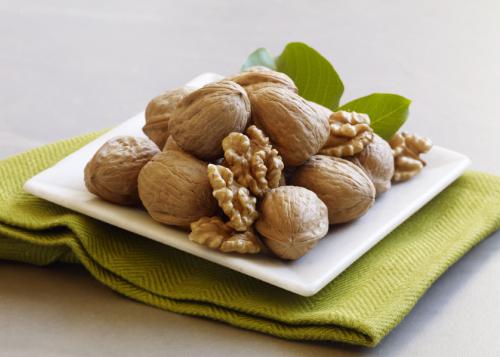CONSUMING just a handful of walnuts every day has a positive effect on memory, concentration and information processing speed, according to research from David Geffen School of Medicine at The University of California–Los Angeles (UCLA).
Led by Dr Lenore Arab, the study found that adults who ate walnuts exhibited consistently greater cognitive function than those who did not. The same results were obtained regardless of age, gender or ethnicity.
"It is exciting to see the strength of the evidence from this analysis across the U.S. population supporting the previous results of animal studies1,2,3 that have shown the neuroprotective benefit from eating walnuts; and it's a realistic amount—less than a handful per day [approximately 13 grams]," said Dr Arab.
The cross-sectional study, which involved individuals between the ages of 20-59 as well as 60 and over, is the first large representative analysis of walnut intake and cognitive function, and the only one to include all available cognitive data across multiple National Health and Nutrition Examination (NHANES) surveys which draw from a wide sampling of the U.S. population between the ages of 1-90.
A boon to ageing population
Results of this research provide baby boomers a simple way to enhance memory and slow Alzheimer’s and dementia. According to a World Health Organization report, the estimated number of new cases of dementia each year worldwide is nearly 7.7 million, and the number of people living with dementia worldwide is estimated at 35.6 million. This number is predicted to double by 2030 and more than triple by 2050.4

Nutritious profile
The key to walnut is its rich antioxidant content (3.7 mmol/ounce),5 combination of vitamins and minerals, and source of alpha-linolenic acid (ALA) at approximately 2.5 grams per ounce. ALA is a plant-based omega-3 fatty acid with heart and brain-health benefits. 6
The full report "A Cross Sectional Study of the Association between Walnut Consumption and Cognitive Function among Adult US Populations Represented in NHANES" has been published online and will appear in the Journal of Nutrition, Health and Aging.
This study was supported in part by funds from the California Walnut Commission.
Resources:
1. Derek R. Fisher, Shibu M. Poulose, Donna F. Bielinski, Barbara Shukitt-Hale, (2014) Serum metabolites from walnut-fed aged rats attenuate stress-induced neurotoxicity in BV-2 microglial cells. Nutritional Neuroscience 0 (0).
2. Poulose, Shibu M. et al. (2012) Walnut diet reduces accumulation of polyubiquitinated proteins and inflammation in the brain of aged rats. Journal of Nutritional Biochemistry, Volume 24, Issue 5, 912 – 919.
3. Lauren M. Willis, Barbara Shukitt-Hale, Vivian Cheng and James A. Joseph (2009). Dose-dependent effects of walnuts on motor and cognitive function in aged rats. British Journal of Nutrition, 101, pp 1140-1144.
4. 10 Facts on Dementia. (2012 April). Retrieved from http://www.who.int/features/factfiles/dementia/en/
5. Halvorsen BL, Carlsen MH, Phillips KM, Bohn SK, Holte K, Jacobs DR, Blomhoff R (2006) Content of redox-active compounds (ie, antioxidants) in foods consumed in the United States. Am J Clin Nutr 84, 95-135.
6. Fleming J, Kris-Etherton P, (2014) The Evidence for α-Linolenic Acid and Cardiovascular Disease Benefits: Comparisons with Eicosapentaenoic Acid and Docosahexaenoic Acid. Adv Nutr (5): 863S-876S.
Nike
 iConnectHub
iConnectHub
 Login/Register
Login/Register Supplier Login
Supplier Login



























